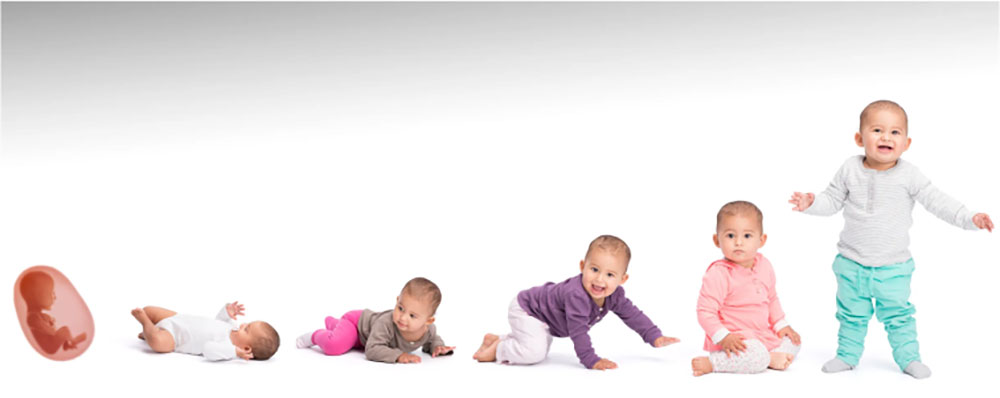Childhood is a crucial phase for every new parent, as they witness the miraculous process of growth and transformation. But it can also get quite overwhelming. It's important to understand the five key stages of development in kids to stay ready and help your little one in their growth journey.
1. Newborns (0-3 Months)
- Reflexes grow: Newborns have a multitude of reflexes (like rooting and sucking) that help them adjust to life outside the womb.
- Sensory exploration: They start absorbing their surroundings through sight, sound, touch, taste and smell.
- Bonding through communication: Respond to their gurgles and coos, sing songs and talk softly to build a strong emotional connection.
2. Infants (4-12 Months)
- Motor milestones: Rolling over, sitting up, reaching for objects and eventually crawling and taking their first steps mark incredible progress.
- Language development: Cooing and babbling evolve into recognizable syllables and eventually simple words.
- Object permanence: They begin to understand that objects exist even when out of sight, leading to peek-a-boo becoming a favourite game. Their vision also gets fully developed.
- Recognition: Infants can start to recognize familiar faces, control their head movements and even bring their hands together.
3. Toddlers (1-3 Years)
- Exploration explosion: Curiosity reigns supreme as toddlers want to touch, taste and investigate everything. Childproofing becomes crucial at this stage.
- The DIY phase: Independence blossoms as toddlers want to dress themselves, eat on their own and assert their autonomy.
- Temper tantrums: Frustration builds as language skills lag behind desires, leading to meltdowns. Stay calm, offer choices and provide comfort.
4. Preschoolers (3-5 Years)
- Playful learning: Play becomes a vehicle for social, emotional and cognitive development. Encourage imaginative play, pretend-play and collaborative activities.
- Enhanced motor skills: At this stage, the motor skills get more refined. Children can play well and in a structured manner. It's a good time for toilet training as well.
- Language boom: Vocabulary expands rapidly and preschoolers start forming complete sentences and asking endless questions. Read together, answer their queries patiently and encourage storytelling.
- Developing friendships: Peer interaction becomes increasingly important as preschoolers learn to share, cooperate and resolve conflicts. Socialising opportunities like playdates and going to preschool can be beneficial.
5. School-age (6-17 Years)
- Opinion building: At this stage, kids slowly grow to form their own opinions. They become independent and grow the ability to draw inferences and read between the lines.
- Language skills: The kids get highly skilled at reading, writing and speaking at this time.
- Emotional development: This is the time for developing various emotions like jealousy, love and others while the skill to express them through words also enhances.
These are the common traits that develop in every kid at the given age range. In case of any delays, remember that every child develops at their own pace. Don't compare your child to others. You should celebrate their tiny achievements and provide positive reinforcement.
However, if you notice any unnatural delay, seek medical counsel. A loving and supportive environment is crucial for a child's all-round development. Keep in touch with your healthcare provider to support your child's unique growth journey.
Sources:
Children’s Medical Center
Medicine Net
CPD Online College
Gray Group International



